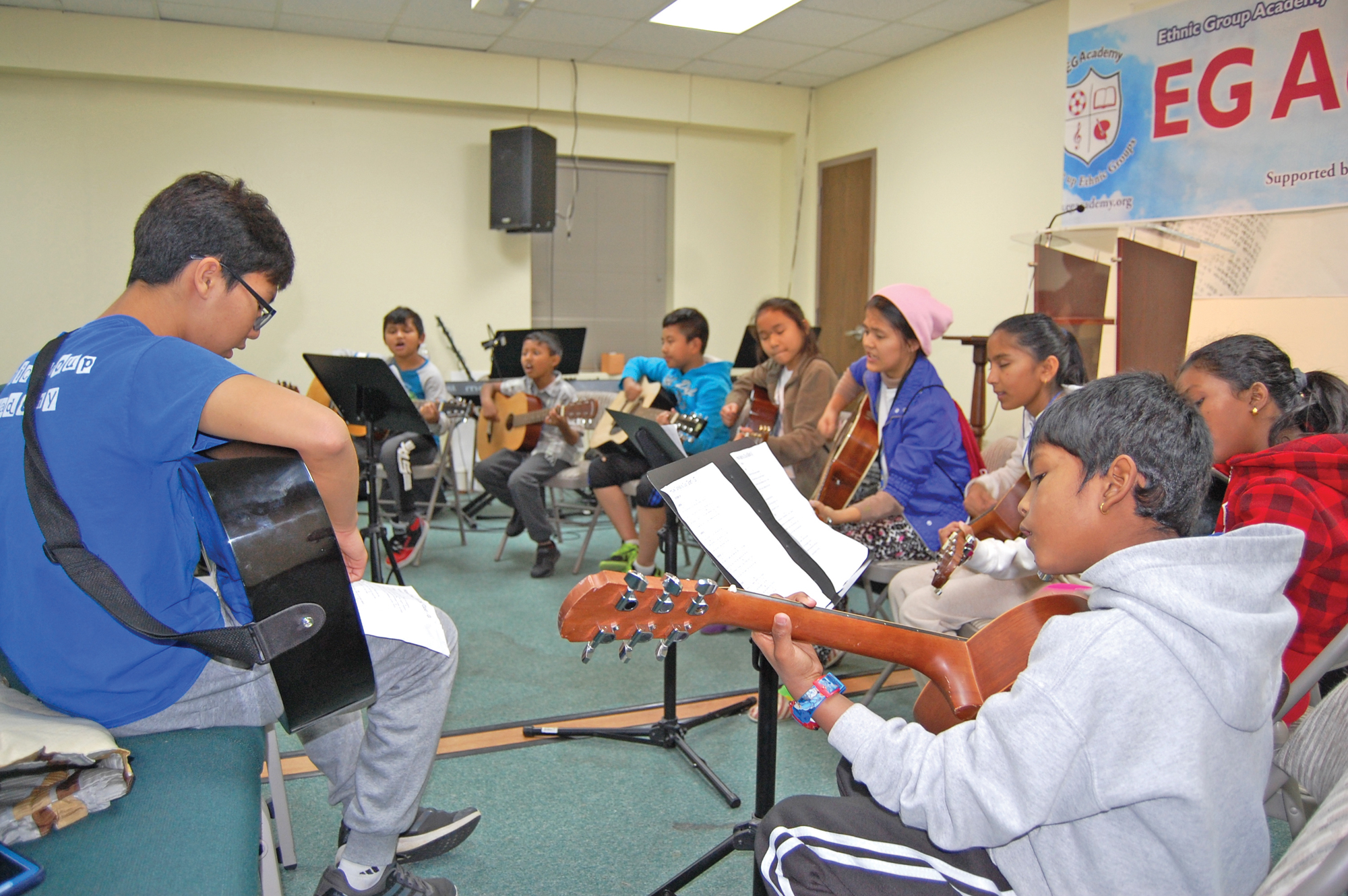
FORT WORTH, Texas (BP) — An international ensemble of eight guitarists enthusiastically played and sang during a December rehearsal. The musicians, like the other refugee children attending weekly classes at the Ethnic Group Academy, reveled in the experience, happy that for at least a couple of hours that Saturday afternoon they could just be kids.
 EGA is a ministry of Hanmaum International Baptist Church, a predominantly South Korean congregation. When Pastor Jong Su Heo learned six years ago about the influx of refugees into Tarrant County, he asked God how his congregation could help. The answer? A reconsideration of the term “foreign missions.”
EGA is a ministry of Hanmaum International Baptist Church, a predominantly South Korean congregation. When Pastor Jong Su Heo learned six years ago about the influx of refugees into Tarrant County, he asked God how his congregation could help. The answer? A reconsideration of the term “foreign missions.”
“With language and culture barriers and everything else, there’s not always much we can do except love these kids and show [and] tell them that we love them and that God loves them,” Ethnic Group Academy (EGA) volunteer Kimberly Brooks told the TEXAN.
She and her husband Jeff, members of another church, have volunteered with the refugee program since it began in 2011. EGA’s mission has become a community project drawing volunteers from Hanmaum International Baptist Church, nearby Southwestern Baptist Theological Seminary, and like-minded congregations.
Heo, a South Korean immigrant, did not share the tumultuous journey of a refugee in coming to America. But he still empathizes with some of their struggles to adapt to life in North Texas. Their arrival in his neighborhood altered Heo’s vision of his congregation as an outreach to South Korean immigrants, seminary students and “Anglo Americans.”
In 2010, the church acquired a two-story, 30-room education building on 5.5 acres of land in order to reach the incoming refugees with the Gospel. While other Christian charities meet refugees’ material needs, EGA fills an essential yet easily overlooked need.
“I think EGA gives refugee kids an opportunity to be like normal kids,” Kimberly Brooks said. “A lot of these families cannot afford or don’t know about extracurricular activities for their kids. EGA is a small opportunity for these kids to participate in something that they might not get to otherwise.”
Violin and guitar lessons, soccer, Taekwondo, choir, arts and crafts, English as a Second Language classes, and SAT tutoring are some of the 11 activities offered every Saturday from 3-5 p.m. during the school year.
Each week the church bus and passenger van collect 85-100 students from two area apartment complexes where refugees are resettled by World Relief, Catholic Charities, and Refugee Services of Texas.
Among the three charities nearly 3,000 people were relocated to Tarrant County between October 2013 and October 2015, according to Jay Long, World Relief Church mobilization program manager. They come from Iraq, Burma, Nepal/Bhutan, Somalia, Eritrea, Congo and Afghanistan.
Mary Mi and her husband Nai San’s Oo and their two children came to Texas from Burma via a Malaysian United Nations refugee camp. Conditions in Burma (also known as Myanmar) left the young family in fear of their lives. Army incursions into their village sent women fleeing into the forest. Men were forced into service as human pack mules bearing heavy loads for the soldiers. Mary said the men would disappear for three to six months at a time.
“Some didn’t come back,” she said.
Cherry Neill, an EGA volunteer, cradled the couple’s 5-year-old daughter Angel in her lap as she filled in the gaps of Mary and Nai San’s story when their English failed them. Although Neill knows the story well, she still bristles at the anguish they suffered and exults in the work of God in bringing the once-faithful Buddhist couple to faith in Christ and then to Texas. The family has grown since their resettlement with the birth of their second son Abraham 18 months ago. Their oldest son Abednego, 8, was a baby when they fled their home.
Mary and Nai San have found a home in Texas and an extended family in Neill and the EGA participants and volunteers.
“My joy overflows almost every day,” Neill told the TEXAN. “I have the jaw-dropping opportunity to serve both believing and pre-believing refugees, who are at least open to friendship if nothing else.”
She and other EGA volunteers cultivate those friendships during the week, often visiting the families in their homes, inviting them to their own homes, assessing needs, providing tutoring, taking them to McDonalds, and beginning a women’s Bible study.
Volunteers see the cultural and language differences not as barriers but as opportunities to speak a common language — love for the children.
“The big thing is that the students have a chance to be around not only other students but every week they are spending time with people who are unequivocally for them — praying for them, caring about them,” Jeff Brooks said.
Heo said the Gospel infuses all that is done at the academy. The Muslim, Hindu and Buddhist refugees recognize EGA is a Christian organization and, at times, accept open Gospel pronouncements.
“I’ve been in cross-cultural ministry for 17 years,” Neill said. “No one has ever refused prayer in [the Lord Jesus’] name.”
Heo believes in God’s call to foreign missions remains. But, in Tarrant County, the world is coming to the church and the mission efforts there are bearing fruit.
“When they came to the U.S. they were refugees, but when they return to their kinsmen they will be American citizens, being equipped with [the] English language, professional knowledge and skills, and above all the good news of Jesus Christ,” Heo said. “I believe this is God’s design to bring people from everywhere to the U.S. to hear the Gospel.”
















